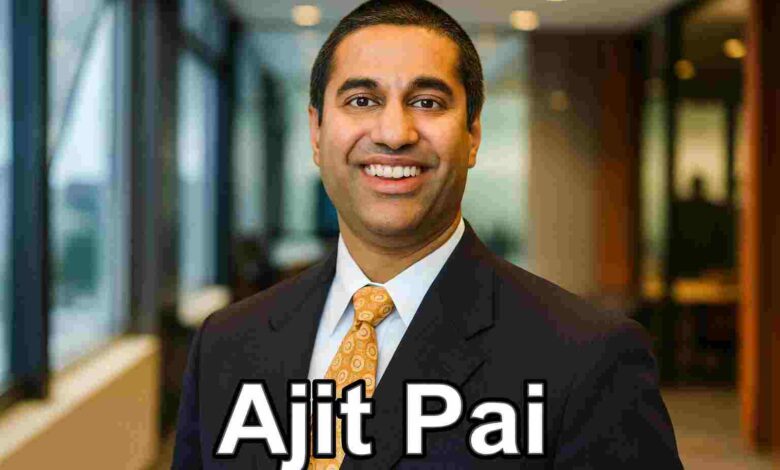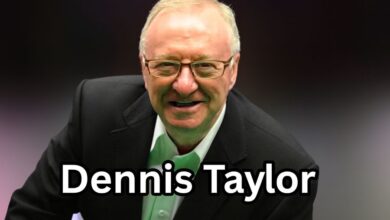Ajit Pai: A Controversial Journey of Leadership and Legacy
Exploring the Life, Career, and Impact of the Former Chairman of the Federal Communications Commission of the United States

Table of Contents
ToggleIntroduction
Ajit Pai is a well-known lawyer and policymaker who made history as the first Indian-American to serve as the Chairman of the Federal Communications Commission of the United States (FCC). His career has been marked by bold decisions, ambitious policies, and intense public debate. Known for his deregulatory approach, Pai gained both praise and criticism for his stance on net neutrality and efforts to expand broadband access across rural America.
Born to immigrant parents from India, Ajit Pai’s story is one of determination, hard work, and strong belief in free-market principles. His leadership at the FCC brought significant changes to the telecommunications industry, influencing how Americans connect to the internet and access digital services. This article provides a detailed look into his life, from his early beginnings to his lasting legacy in U.S. communications policy.
Quick Bio of Ajit Pai
| Field | Details |
|---|---|
| Full Name | Ajit Varadaraj Pai |
| Date of Birth | January 10, 1973 |
| Age (2025) | 52 years |
| Birthplace | Buffalo, New York, U.S. |
| Nationality | American |
| Ethnicity | Indian-American |
| Parents | Varadaraj Pai (Father), Radha Pai (Mother) |
| Spouse | Janine Van Lancker |
| Children | Two |
| Education | B.A. Harvard University, J.D. University of Chicago Law School |
| Known For | Former Chairman of the FCC |
| Political Affiliation | Republican |
Early Life and Education
Family Background
Ajit Pai was born in Buffalo, New York, to Indian immigrant parents who worked in the medical field. His father, Varadaraj Pai, was a urologist, and his mother, Radha Pai, was an anesthesiologist. The family later moved to Parsons, Kansas, where Ajit spent most of his childhood. Growing up in a small Midwestern town helped shape his values and understanding of rural America, a perspective that would later influence his policies at the FCC.
Educational Journey
Ajit Pai’s academic achievements began at Parsons Senior High School, where he graduated in 1990. He later attended Harvard University, earning a Bachelor of Arts degree in Social Studies with honors in 1994. His passion for law and public policy led him to pursue a Juris Doctor degree at the University of Chicago Law School, graduating in 1997. During law school, Pai served as an editor for the University of Chicago Law Review and won the prestigious Mulroy Prize for excellence in evidence law.
The Start of His Career
Legal Foundations
Ajit Pai began his professional journey as a law clerk for Judge Martin Leach-Cross Feldman of the U.S. District Court for the Eastern District of Louisiana. This early experience gave him valuable insights into federal law and regulatory frameworks.
After his clerkship, Pai joined the U.S. Department of Justice Antitrust Division, where he focused on telecommunications mergers and regulatory compliance. This role sparked his long-term interest in telecommunications and technology policy.
Transition to Verizon and Government Roles
In 2001, Pai transitioned to the private sector, working as Associate General Counsel for Verizon Communications. At Verizon, he gained hands-on experience with competition issues and broadband deployment, which would later prove invaluable during his time at the FCC.
Later, he returned to public service, working for the U.S. Senate Judiciary Committee and later for the FCC’s Office of General Counsel, where he rose to the position of Deputy General Counsel by 2011.
Rise to FCC Leadership
FCC Commissioner Appointment
On November 30, 2011, Ajit Pai was nominated by President Barack Obama to serve as an FCC Commissioner, representing the Republican party. He was unanimously confirmed by the Senate and sworn into office on May 14, 2012. During this time, he focused on promoting innovation and reducing regulatory barriers for the telecommunications industry.
Chairman of the FCC
Ajit Pai’s leadership reached its peak when President Donald Trump appointed him as Chairman of the FCC in January 2017. As Chairman, Pai became a central figure in the national debate over internet regulation and digital policy. His decisions shaped the direction of U.S. communications for years to come.
Key Policies and Achievements
Repeal of Net Neutrality
One of Pai’s most controversial actions was the repeal of the 2015 Open Internet Order, commonly known as net neutrality. Pai argued that removing heavy regulations would encourage innovation and investment in broadband infrastructure. Supporters praised the move as pro-business, while critics feared it would allow internet providers to prioritize certain services over others.
Broadband Expansion
Pai was passionate about closing the digital divide, especially in rural communities. Under his leadership, the FCC took steps to simplify broadband deployment and allocate funding to underserved areas. His policies aimed to ensure that all Americans had access to reliable high-speed internet.
Consumer Protection
During his tenure, Pai introduced initiatives to combat robocalls, allowing telecom companies to block unwanted calls by default. He also played a crucial role in launching the 988 Suicide Prevention Hotline, a simple, nationwide number to provide help during mental health crises.
Post-FCC Career and Current Role
After stepping down as FCC Chairman on January 20, 2021, Ajit Pai entered the private sector. In April 2021, he became a partner at Searchlight Capital Partners, a private equity firm. His work focused on telecommunications and technology investments.
In April 2025, Pai took on a new leadership role as President and CEO of CTIA, a major U.S. wireless industry trade association. This position allows him to continue influencing the future of wireless communications and 5G development.
Legacy and Impact
Ajit Pai’s legacy is complex and deeply debated. His tenure as FCC Chairman is often defined by the net neutrality debate, which polarized public opinion. While some hail him as a visionary deregulator who promoted innovation, others criticize him for weakening consumer protections.
Beyond controversy, Pai’s efforts to expand broadband access and modernize telecommunications infrastructure have had lasting positive effects. His policies on consumer protection, especially related to robocalls and mental health services, are widely regarded as meaningful contributions to society.
Conclusion
Ajit Pai’s journey from a small-town upbringing in Kansas to becoming the Chairman of the Federal Communications Commission of the United States reflects his dedication to public service and technology policy. As a lawyer, policymaker, and leader, Pai has shaped critical aspects of how Americans connect to the digital world.
Whether praised or criticized, his actions have left a permanent mark on U.S. communications policy. Today, as the CEO of CTIA, Ajit Pai continues to influence the future of technology and telecommunications, ensuring his role in the industry remains significant for years to come.
FAQs
Who is Ajit Pai?
Ajit Pai is an American lawyer and policymaker who served as Chairman of the Federal Communications Commission (FCC) from 2017 to 2021.
What is Ajit Pai best known for?
He is best known for leading the repeal of net neutrality regulations and promoting broadband expansion across rural America.
When did Ajit Pai become FCC Chairman?
He was appointed as FCC Chairman by President Donald Trump in January 2017.
What is Ajit Pai’s current role?
As of April 2025, Ajit Pai serves as the President and CEO of CTIA, a leading U.S. wireless industry trade association.
Why was Ajit Pai’s net neutrality decision controversial?
Critics argued that repealing net neutrality could allow internet service providers to favor certain websites or services, while supporters claimed it encouraged innovation and investment.
What were Ajit Pai’s achievements at the FCC?
His major achievements include broadband expansion efforts, policies to combat robocalls, and establishing the 988 Suicide Prevention Hotline.
What is Ajit Pai’s educational background?
Ajit Pai holds a B.A. in Social Studies from Harvard University and a J.D. from the University of Chicago Law School.



